Ho Surname Ancestry ResultsOur indexes 1000-1999 include entries for the spelling 'ho'. In the period you have requested, we have the following 69 records (displaying 51 to 60): Single Surname Subscription | | | Buying all 69 results of this search individually would cost £328.00. But you can have free access to all 69 records for a year, to view, to save and print, for £100. Save £228.00. More... |
These sample scans are from the original record. You will get scans of the full pages or articles where the surname you searched for has been found. Your web browser may prevent the sample windows from opening; in this case please change your browser settings to allow pop-up windows from this site. Early records of Wells cathedral, in Somerset
(1001-1500)
Three early registers of the dean and chapter of Wells - the Liber Albus I (White Book; R I), Liber Albus II (R III), and Liber Ruber (Red Book; R II, section i) - were edited by W. H. B. Bird for the Historical Manuscripts Commissioners and published in 1907. These three books comprise, with some repetition, a cartulary of possessions of the cathedral, with grants of land dating back as early as the 8th century, well before the development of hereditary surnames in England; acts of the dean and chapter; and surveys of their estates, mostly in Somerset.HO. Cost: £6.00.  | Sample scan, click to enlarge

| Lichfield Diocese Ordinations: Deacons Secular
(1508)
The diocese of Coventry and Lichfield at this period included the whole of Cheshire, Staffordshire and Derbyshire; all Lancashire south of the Ribble; northern Shropshire (including Shrewsbury); and northern Warwickshire (including Birmingham and Coventry). Ordinations took place on the four Ember Saturdays in the year, and on certain other occasions; lists of ordinands to the degrees of acolyte, subdeacon, deacon and priest were preserved in the ordination registers, a distinction being made between those clerks who were 'regular', i. e., monks, friars, &c., and those who were 'secular', the main body of the clergy. All ordinands were celibate, and those regular, and the secular who obtained benefices, remained so, but only a minority of the secular ordinands ever obtained benefices, and most will doubtless have married later in life. No man might be ordained to subdeacon or higher without proving either that he was of independent means or that he was sponsored by an institution or a gentleman. Most entries in the register of such ordinations therefore have the words 'ad titulum' followed by the name of the religious house that was the sponsor. This is an important indication of the man's origins - boys whose families were monastic tenants, and who were educated by the monks, would naturally be sponsored by the abbey. Only men who were born and bred in the diocese could be ordained by the bishop, unless producing letters dimissory from the bishop of the diocese of their birth. These are the ordinations celebrated on Ember Saturday, 23 September 1508, by Thomas, bishop of Panados (Pavados), suffragan of bishop Geoffrey Blythe, in Lichfield cathedral.HO. Cost: £8.00.  | Sample scan, click to enlarge

| Lichfield Diocese Ordinations: Priests Secular
(1508)
The diocese of Coventry and Lichfield at this period included the whole of Cheshire, Staffordshire and Derbyshire; all Lancashire south of the Ribble; northern Shropshire (including Shrewsbury); and northern Warwickshire (including Birmingham and Coventry). Ordinations took place on the four Ember Saturdays in the year, and on certain other occasions; lists of ordinands to the degrees of acolyte, subdeacon, deacon and priest were preserved in the ordination registers, a distinction being made between those clerks who were 'regular', i. e., monks, friars, &c., and those who were 'secular', the main body of the clergy. All ordinands were celibate, and those regular, and the secular who obtained benefices, remained so, but only a minority of the secular ordinands ever obtained benefices, and most will doubtless have married later in life. No man might be ordained to subdeacon or higher without proving either that he was of independent means or that he was sponsored by an institution or a gentleman. Most entries in the register of such ordinations therefore have the words 'ad titulum' followed by the name of the religious house that was the sponsor. This is an important indication of the man's origins - boys whose families were monastic tenants, and who were educated by the monks, would naturally be sponsored by the abbey. Only men who were born and bred in the diocese could be ordained by the bishop, unless producing letters dimissory from the bishop of the diocese of their birth. These are the ordinations celebrated on Ember Saturday, 23 December 1508, by Thomas bishop of Panados (Pavados), suffragan of bishop Geoffrey Blythe, in Lichfield cathedral.HO. Cost: £8.00.  | Sample scan, click to enlarge

| Missionary work in China
(1855)
The Congregational and a number of other independent churches together formed the Evangelical Alliance, committed to promoting and supporting missions to the heathen. The areas chosen for their projects were Guiana, South Africa, India, the South Seas and China. The work of the missionaries was not only in preaching the Gospel, but also in translating the Bible into local languages, and establishing churches, schools and orphanages. Orphans and native teachers were often given the names of principal contributors or congregations back in Britain. In Britain the large amounts of money needed for this work were raised among the Congregational and independent congregations, arranged by auxiliaries for each county (although some contributions for each county might in fact come in from congregations and individuals in neighbouring areas); money was gathered by ministers, at special services, by supporters, and in missionary boxes. The accounts of all these contributions were published as part of a monthly magazine called the Evangelical Magazine. Each issue of the magazine carried obituaries of prominent members of the congregations; general articles on religion; reviews of newly-published religious books; home news, mainly about meetings of importance or interest by the alliance or in individual churches; and then a separate section called the Missionary Chronicle. The Missionary Chronicle was devoted to letters and reports from the missionaries; and concludes with a set of accounts of donations towards the missionary work. This is the index to the missionary work reported in the magazine, January to December 1855, in China, and among the Chinese workers in the gold rush in Australia.HO. Cost: £6.00.  | Sample scan, click to enlarge
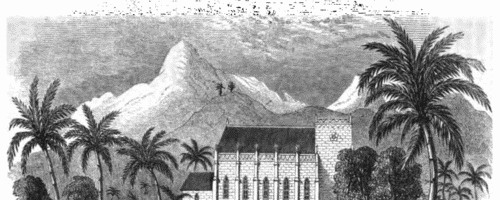
| Men-at-the-Bar
(1885)
Joseph Foster's Hand-List of Men-at-the-Bar gives a paragraph biography of men who had been called to the bar and were alive in 1885. After the full name (surname first, in capitals) there is a short statement of occupation or practice; a student at which inn of court; when called to the bar; father's name and then address; when born; if married, and, if so, wife's name (and her father's name) is often given. At the foot, in small type, is present residence, as of 1885.HO. Cost: £4.00.  | Sample scan, click to enlarge
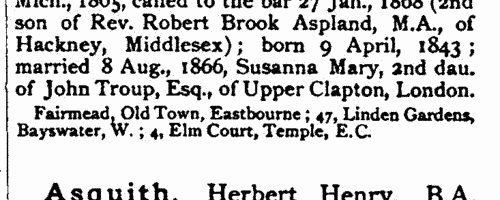
| Indians in the Indian Empire
(1895)
Thacker's Indian Directory lists prominent natives of the cities of Calcutta, Bombay and Madras, and throughout the Indian Empire. Profession is usually stated, and an address - a station, or for Calcutta a full address.HO. Cost: £4.00.  | Sample scan, click to enlarge
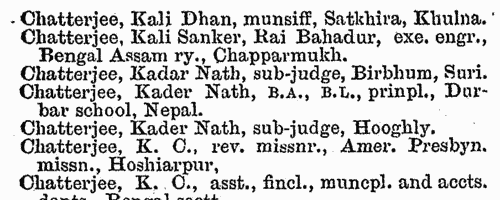
| Missing Next-of-Kin and Heirs-at-Law
(1900)
The Unclaimed Money Registry and Next-of-Kin Advertisement Office of F. H. Dougal & Co., on the Strand in London, published a comprehensive 'Index to Advertisements for Next of Kin, Heirs at Law, Legatees, &c., &c., who have been Advertised for to Claim Money and Property in Great Britain and all Parts of the World; also Annuitants, Shareholders, Intestates, Testators, Missing Friends, Creditors or their Representatives, Claimants, Unclaimed and Reclaimed Dividends and Stock, Citations, Administrations, Rewards for Certificates, Wills, Advertisements, &c., Claims, Unclaimed Balances, Packages, Addresses, Parish Clerks' Notices, Foreign Intestates, &c., &c.' The original list was compiled about 1880, but from materials dating back even into the 18th century: most of the references belong to 1850 to 1880. For each entry only a name is given, sometimes with a placename added in brackets: there may be a reference number, but there is no key by which the original advertisement may be traced. The enquirer of the time had to remit £1 for a 'Full and Authentic Copy of the Original Advertisement, together with name and date of newspaper in which the same appeared'. This appendix to the list was issued in about 1900.HO. Cost: £4.00.  | Sample scan, click to enlarge
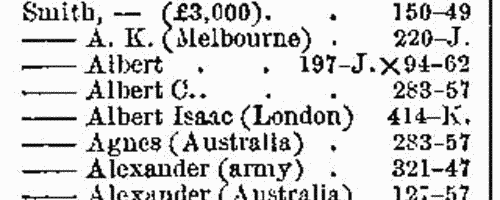
| Medical practitioners qualified in Britain or Ireland but living abroad
(1926)
The Medical Directory was split into several sections. The Practitioners Resident Abroad section covered all medical practitioners who, having qualified in Britain or Ireland or otherwise registered under the medical Acts of Great Britain and Ireland, were living abroad. Each year a schedule was sent to each doctor to be returned to the publishers, so as to keep the directory up to date. In the directory the doctor's name is given first, in bold, surname first, in capitals; then current address. Next are the qualifications; the italic abbreviations in parentheses following the qualifications indicate the medical school at which they were gained. Then there is a list of posts and honours within the profession, starting with those then current; previous posts are preceded by the word 'late'. Finally, brief details are given of any publications. HO. Cost: £4.00.  | Sample scan, click to enlarge

| Specialists in tropical medicine and hygiene
(1928)
The Royal College of Surgeons, established by royal charters, issued this calendar 1 August 1928, including official lists of all its fellows, members, licentiates and diplomates. The register of fellows gives full name (surname first) and address (in italics), with dates of admission as fellow and member. The list of members gives year of admission, full name (surname first) and town or country of residence. The lists of licentiates give year of admission and full name, but no indication of current address: entries of fellows of the college are prefixed with a double dagger, those of members with an asterisk. The lists of diplomates give year of admission and full name (surname first), with those diplomates who were neither members nor fellows of the college indicated with a dagger. This is the index to the diplomates in tropical medicine and hygiene (a qualification granted conjointly with the Royal College of Physicians of London).HO. Cost: £6.00.  | Sample scan, click to enlarge
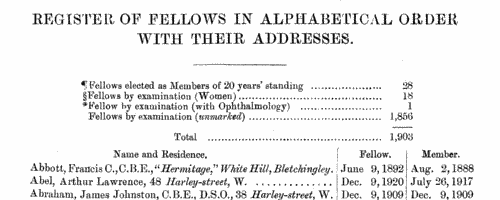
| Surgeons
(1928)
The Royal College of Surgeons, established by royal charters, issued this calendar 1 August 1928, including official lists of all its fellows, members, licentiates and diplomates. The register of fellows gives full name (surname first) and address (in italics), with dates of admission as fellow and member. The list of members gives year of admission, full name (surname first) and town or country of residence. The lists of licentiates give year of admission and full name, but no indication of current address: entries of fellows of the college are prefixed with a double dagger, those of members with an asterisk. The lists of diplomates give year of admission and full name (surname first), with those diplomates who were neither members nor fellows of the college indicated with a dagger. This is the index to the members.HO. Cost: £6.00.  | Sample scan, click to enlarge
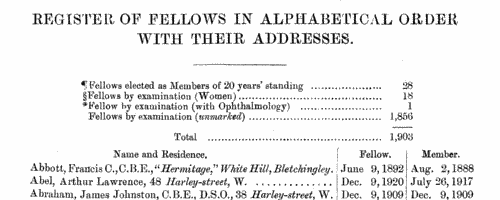
|
Research your ancestry, family history, genealogy and one-name study by direct access to original records and archives indexed by surname.
|












